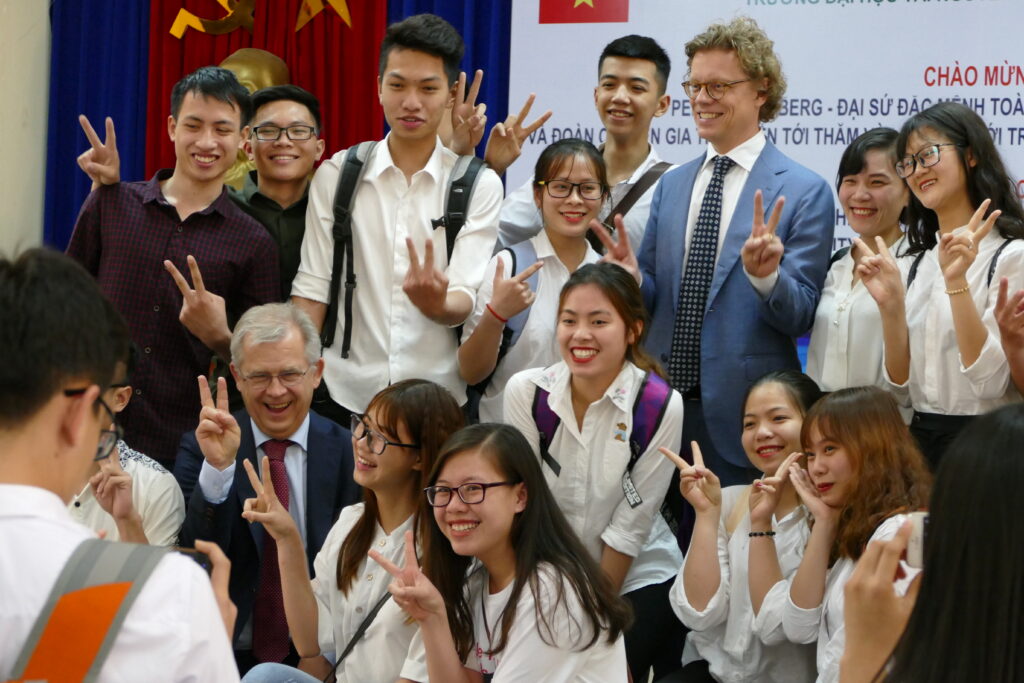As Vietnam maintains its rapid development, the challenges for harmonising it with a healthy environment multiply. SEI had the opportunity to speak with Sweden’s Ambassador to Vietnam, Pereric Högberg, during Vietnam Water Week 2018 on his extensive travels in the country and what he sees as keys to a sustainable future where both people and environment thrive.

Ambassador Högberg with students from Vietnam’s Ministry of Natural Resources and Environment University. Photo: Jamie Kemsey / SEI.
SEI Asia Centre Director Niall O’Connor joined Sweden’s Ambassador to Vietnam, Pereric Högberg, for an ambitious slate of water and climate change related events during Vietnam Water Week 2018, held in late February and early March in Hanoi. As Vietnam develops apace along with the Mekong Region of Southeast Asia its environmental challenges are also increasing.
During the week, the Swedish Embassy programme aimed to make connections and discuss future collaboration and included a special “Source to Sea” session during the exhibition days, meetings with Vietnam’s Ministry of Environment and Natural Resources (MONRE), an assembly with MONRE University students, press events and a TV talk show appearance, and a visit to the rapidly expanding southern coastal city of Nha Trang to discuss its challenges as it seeks to quadruple its number of tourists.
Over a lunch of traditional Vietnamese pho (noodle soup) and spring rolls, Ambassador Högberg was upfront about the country’s environmental challenges, but also energised about future opportunities that result from taking them on.
How do you see the mood in Vietnam today in regard to the environment?
I believe the majority of Vietnamese today have safety issues on their mind, in the main areas of water, food and air. I have travelled extensively in this country, and though most have a better life than they did a few years or a generation ago, there is a question in regard to sustainability. Will this development be sustainable? The government realises this, and is taking appropriate action. But there is also the question of the country’s regulatory framework: how will it tackle environmental issues?
Today, the increasing natural disasters are being blamed on climate change. How will people respond to what we have created ourselves? For this, there is a question of access to information. A big part of the challenge is just getting the knowledge out and ensuring it reaches people and communities. One answer could be direct dialogue. How will the government respond and how can we use that knowledge to take action?
What specific current and upcoming challenges do you see?
Rivers are the lifeblood of Vietnam, and the Mekong and other deltas will face ever increasing pressures due to development and climate change. We are already seeing the impacts of these pressures. The Mekong Delta, for example, has seen an increase in saltwater intrusion due to sea level rise, reduced river flows and shrimp farming. The question of water – too much, or lack of it, and how it is used – is vital.
How can we build awareness of these issues and how is the Swedish Embassy getting involved?
We need to build campaigns on consumer behaviour and taking individual responsibility. Initiatives for consumer responsibility are important. For example, plastic waste is a big issue in the country, yet there is very little debate on it.
Sweden has been active in Vietnam since 1969, and has had a very large aid programme. That programme now focuses mainly on a more equitable partnership approach. Frankly, we are here partly to promote economic development for Sweden – and we want to share that model with our Vietnamese counterparts.
Vietnam, however, has also been very impressive in its approach to multi-lateral forums and programmes. Government, universities and organizations here work closely with organizations like SEI on seminars and events that often stand behind the Swedish example.
What do you see as the next steps as we move forward, and the country continues to develop?
The bilateral aid program has now come to an end, and we currently don’t have the funding for an extensive regional approach from a Vietnamese perspective, but I feel this is the way to go. Vietnam can reach out and work more with its neighbors. Mekong region countries are interlinked and they need to work together. The majority of Vietnam’s water, for example, comes from other countries. It would be great if we encourage regional approaches to some of these environmental challenges.
In addition, Swedish businesses such as H&M and IKEA are continuing to work on long-term sustainable solutions. IKEA is responsible for 110,000 jobs in Vietnam, and it also sources its outdoor furniture here, while ensuring its work is socially and environmentally responsible. The private sector can play a large role in encouraging good stewardship of natural resources, and CSR (corporate social responsibility) is important.
Sweden has been a long-term partner in Vietnam and we hope to continue to play a role in ensuring that its water, land and air is well-managed so that its current growth is green and sustainable. We look toward strengthening our already solid partnerships here with Vietnam’s government and communities.
Design and development by Soapbox.